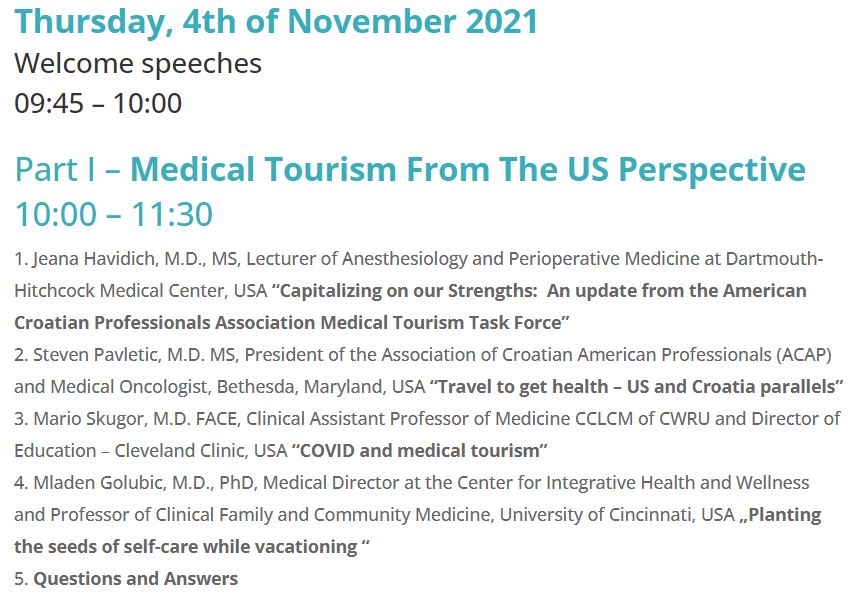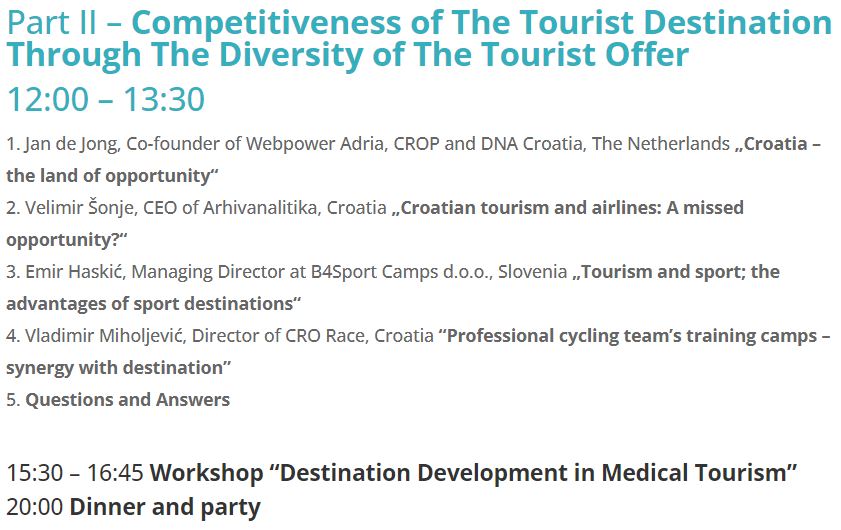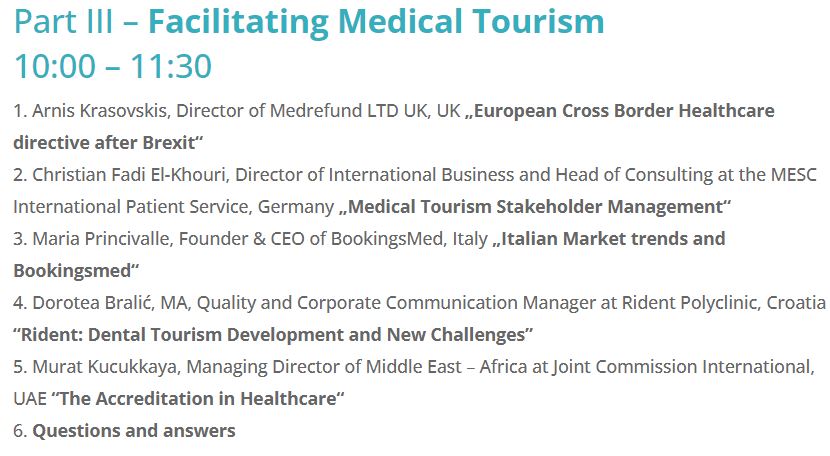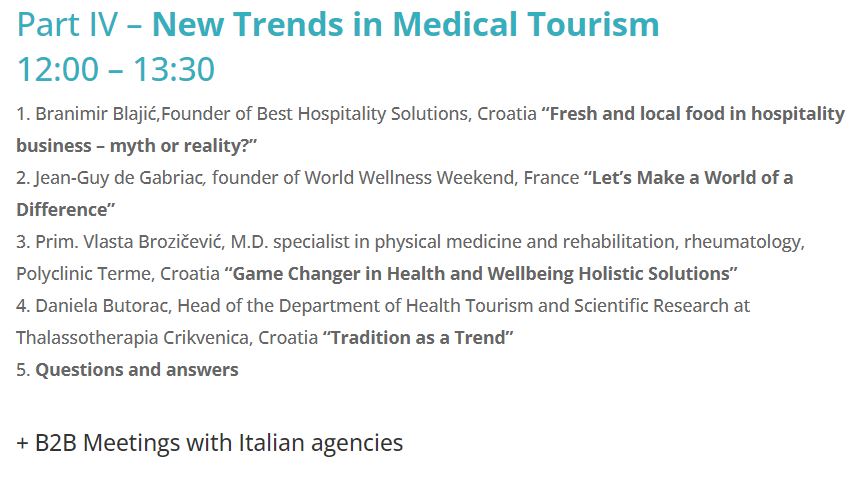Croatia Logs More Than 3,500 New COVID-19 Cases, 25 Deaths
ZAGREB, 23 Oct 2021 - In the past 24 hours Croatia has registered 3,585 coronavirus cases and 25 related deaths, the national COVID-19 crisis management team said on Saturday.
There are 17,319 active cases, including 1,033 hospitalized patients, of whom 128 are on ventilators, while 27,714 persons are self-isolating.
Croatia has registered 443,032 coronavirus cases to date as well as 9,010 COVID deaths and 416,703 recoveries, including 1,541 in the past 24 hours, while 3,026,033 persons have been tested for the virus, with 11,193 in the past 24 hours.
To date, 46.46% of the population has been vaccinated, including 55.67% of adults, of whom 52.43% fully.
For all you need to know about coronavirus specific to Croatia, make sure to bookmark our dedicated COVID-19 section and select your preferred language.
All Croatian Medical Tourism Roads Lead to Crikvenica with CIHT 2021
October 23, 2021 - The enormous potential of the Croatian medical tourism industry will once more be the focus next month, as global experts assemble for the annual Crikvenica International Health Tourism conference, CIHT 2021.
After reporting on the news about Croatia for a number of years now, certain things begin to follow a pattern.
I always report on the Za Krizen procession in Jelsa just before Easter, for example, and there is always a visit to Advent in Zagreb. And early November is reserved for one of my favourite - and impressive - conferences in Croatia, the Crikvenica International Health Tourism conference, or CIHT 2021.
It has a special place in my heart as it was the catalyst for probably the most unlikeliest stories of my writing career a couple of years ago, as my wife and I found ourselves on a plane to Malaysia where I picked up an award for best online international feature as the inaugural Medical Travel Media Awards in Kuala Lumpur.
Crikvenica and Malaysia may seem an unlikely combination, and I would have agreed with that had I not met one of the most energetic promoters of all things Croatia, Ognjen Bagatin.
Co-owner of the hugely successful Bagatin Clinic, Ognjen was passionate about the promotion of the medical tourism industry and realising its potential.
When I met him, I had no idea that Croatia even had a medical tourism industry. Within 10 minutes of meeting him, I was wondering why the whole world didn't know about the excellence on offer in Croatian clinics, and at very competitive prices.
It did not take me long to learn that the biggest brand in Croatian medical tourism globally - with the possible execption of Bagatin Clinic at St Catherine's Specialty Hospital - was not in fact Croatia itself, but something called the Kvarner Health Tourism Cluster. This was an alliance of interested stakeholders in the medical tourism industry who were doing fantastic work bringing patients for treatment in a number of specialist medical fields, from dentistry to physiotherapy.
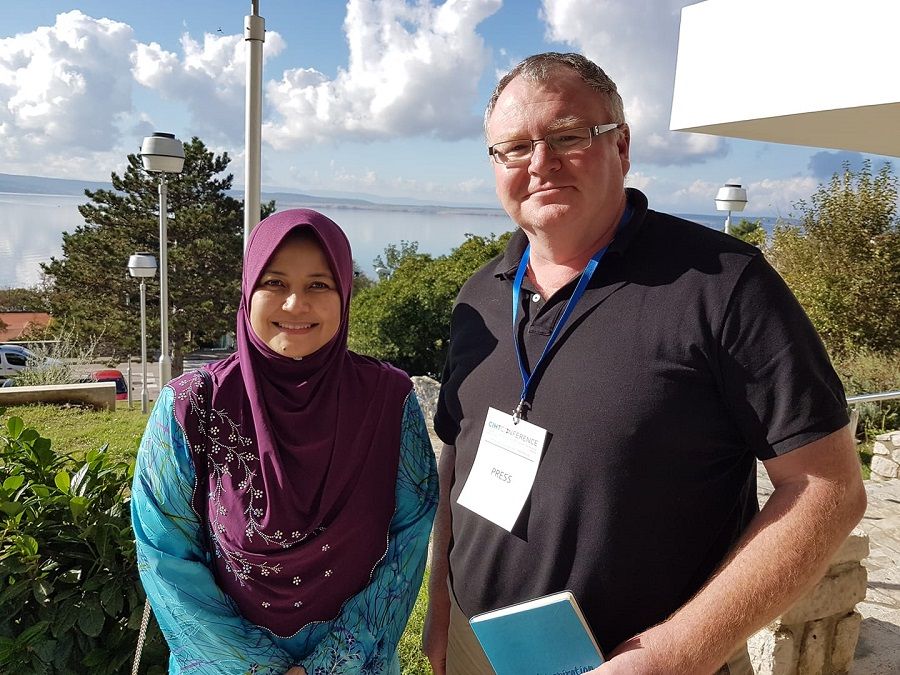
The highlight of the Kvarner Health Tourism Cluster's calendar was an annual conference called CIHT (Crikvenica International Health Tourism conference). Ognjen encouraged me to participate where he promised a great conference with some outstanding presentations and people to interview.
I was stunned by the high-quality of the international experts who had all made the journey to the Crikvenica Riviera for this health conference out of season in November. Keynote speakers I got to interview included Keith Pollard, Editor-in-Chief of the International Medical Travel Journal, Ilan Geva from the USA, a leading medical tourism (and other) branding specialist, and Sherene Azli, the charismatic CEO of the Malaysia Healthcare Travel Council.
Sherene's presentation was one of the finest I have seen at every conference, and little did I know it, but that interview started a chain of events which would have me on that plan to Kuala Lumpur less than a year later.
A year later, I was back in Crikvenica, this time also as a (terrible) conference speaker, sharing the podium with medical tourism experts who had flown in from leading establishmnents such as Mayo Clinic and Cleveland Clinic.
The Crikvenica was a hit, and a significant player in the global medical tourism calendar. And after the horrors of the 2020 pandemic, I shall once more be making my way down to the Crikvenica Riviera early next month, to take part in CIHT 2021.
After a brief (ok, not so brief) COVID interruption last year, Croatian medical tourism is back, and with some very useful additions to the story. The massive expansion of Ryanair (40 destinations for Zagreb alone by next summer) is opening up affordable Croatian medical tourism to more countries and destinations than ever before.
Another welcome trend is the rise in the remote work culture. Croatia is enjoying considerable success in its digital nomad story, and the excellent services of the medical tourism industry should be inserted into that initiative, to the benefit of all sides.
CIHT 2021 once more has a very strong lineup, and anyone interested in the medical tourism industry will find a night for them at this year's event. You can see the programme of the two-day event above, and you can get more details and register on the official website.
I can't promise you a trip to Malaysia if you do attend, but it is definitely one of the best organised, most social, and content-rich conferences on the Croatian conference scene.
120,000 More Croatian Residents to Get Free Supplementary Health Insurance
October the 23rd, 2021 - As many as 120,000 Croatian residents are set to get free supplementary health insurance (dopunsko) provided to them by the state. These individuals are overwhelmingly pensioners.
As Poslovni Dnevnik writes, as of December the 1st, 2021, as many as 120,000 Croatian residents, primarily pensioners, will receive a supplementary health insurance policy from HZZO at the expense of the state.
At yesterday's session, the Croatian Government accepted Silvano Hrelja's proposal to amend the Law on Voluntary Health Insurance, which raises the income threshold on the basis of which Croatian residents are entitled to the state to pay for their supplementary health insurance, so, in the future, the threshold per household member will be two thousand kuna, and for a single person it will rise to two and a half thousand kuna.
This represents an increase in both categories by more than 400 kuna, or 25 percent compared to the current census, and Croatian Health Minister Vili Beros explained that in the future, an additional 120,000 Croatian residents will, as stated, receive a supplementary HZZO health insurance policy at the expense of the state. The state budget will have around one hundred million kuna per year taken out of it as a result.
The fact that the Croatian Government is ready and willing to accept Silvano Hrelja's proposal could be inferred from the fact that among the MPs who signed the support for sending legal changes to the parliamentary procedure were numerous HDZ members, and Minister Beros himself said that this sets a more appropriate threshold for the most socially sensitive in our society.
Hrelja's support from the Croatian Government has already resulted in the previously announced intervention in the area of family pensions, which the Government has included in the national recovery and resilience plan, taking place two years earlier than originally envisaged, which should bring a 10 percent increase to pensions for more than 200,000 retirees as of the year 2023, Novi list writes.
For more, make sure to check out our lifestyle and politics sections.
Zagreb Yamaha Music School (YMS) Programme Opens to Music Lovers
October the 23rd, 2021 - The well known Yamaha Music School (YMS) music programme, present today in more than forty countries around the world, has arrived in Zagreb this autumn, at the newly opened school at Tuskanova 37. The new Zagreb Yamaha Music School is already attracting a lot of attention.
As Poslovni Dnevnik/Lucija Spiljak writes, on October the 21st, an open day was organised, and those interested had the opportunity to try out the Yamaha Music School's popular singing programmes, acoustic, classical and electric guitars, bass guitars, drums, keyboards and pianos, saxophones, violins and flutes. They were conducted through the programmes by licensed mentors and experts.
The concept of YMS is based on a unique structured curriculum followed by books and materials from beginner to professional level. The feature, as they say from YMS, is group music making and a focus being placed on the creativity and individuality of the participants, and a less traditional approach which, as they claim, often results in a loss of motivation and distancing from music as a subject.
YMS licensor Olja Desic says that the new school is already filling up its existing groups, and they are forming new ones due to the large number of interested people in Zagreb. They already have more than 180 students and there is a growing interest in individual lessons, and the mentors at YMS are happy that people want to develop their musicality.
"There are no non-musical people, only undiscovered talent, and this goes for children, teenagers, and adults. All those who want to bring music back into their lives, for the reason of becoming musicians or just hobbyists. Every motive is a good motive,'' claims Desic.
The new Zagreb Yamaha Music School is therefore intended for all generations - from as early as 1.5 years old, kids can start being educated in all sorts of entertainment fields, and for kids over eight - including adults (without an upper age limit), they have a developed curriculum followed by Yamaha Music Education textbooks; various modern instruments, but also classical ones such as the violin, flute, piano and the classical guitar. Desic also referred to the teachers at the new Zagreb Yamaha Music School. who, as she says, are very carefully chosen.
“The unique method of group teaching for which all our teachers have mastered the necessary competencies, and in which there are written books and sound recordings just for that way of working, is the greatest jewel of YMS, and this is proven every day in practice.
We carefully select the people we want to work with, respecting the set standards of the quality of knowledge, skills, career achievements and, in particular, the personalities needed by YMS. Those who respond to our call have several important steps to access this system, which is extremely quality-controlled: they take an online theoretical and practical exam assessed by a commission in Hamburg, and are required to attend methodological seminars before starting work,'' she said.
The first Yamaha Music School was founded in Japan back in 1954, and to date it has become present in about 40 countries, with more than 6,000 schools, through whose system more than 30 million students have passed so far.
The first Croatian branch was opened in Rijeka in 2019, followed by Cakovec, and now the Zagreb Yamaha Music School is open. YMS Rijeka has grown almost to its full capacity in just two years and currently has about 250 participants, and YMS Cakovec has about 80.
For more, make sure to check out our lifestyle section.
Finance Minister Zdravko Maric Talks Rebalances, Projections, Eurozone
October the 23rd, 2021 - Finance Minister Zdravko Maric has spoken out about rebalances, projections for the future, stability and of course, the topic on the lips of most - Croatian Eurozone entry, which is edging ever closer.
As Poslovni Dnevnik/Ana Blaskovic writes, at the end of this year or at the very beginning of 2022, the situation in the Republic of Croatia should return to pre-crisis levels. This is of course good news for the domestic economy with the perspective of Eurozone entry in 2023, but this generally optimistic picture is still being threatened by numerous risks, from poor vaccination levels to so-called ''bubbles'' on the Croatian real estate market. These matters could be heard being discussed at the conference of the Zagreb Stock Exchange and pension funds entitled "The Challenge of Change/Izazov promjene".
Finance Minister Zdravko Maric announced that he would step out next week with a rebalance and a few new projections.
"At the end of this year, or at the beginning of next year, we should reach pre-pandemic figures," he assured. The Croatian Government will also refresh its fiscal expectations for the next three years, which will be marked by the implementation of the National Recovery and Resilience Plan, the effects of which should boost GDP by 1.5 percentage points on average.
818 million euros have been pumped into Croatia so far, and the new cash injections will depend on the fulfillment of 34 different criteria by the end of the year. If they're met, the government will submit a report to the European Commission (EC) in January or February, and then "we can expect a new payment in May or June."
In terms of Eurozone accession, Finance Minister Zdravko Maric says, everything is currently going according to plan. Interest rates and the exchange rate aren't in question, but inflation is a new fear. "Inflation is a priority for us because of society, the economy and of course because of people, but we should also look at it through Maastricht, even though Croatia is at the EU average. According to these projections, we should satisfy that as well. The real date of joining the Eurozone is 2023, I see no reason as to why we won't manage to meet the criteria,'' said Maric.
The introduction of the euro as Croatia's official currency could reduce the risk premium by two levels and thus partially amortise the possible growth of interest rates, which has been a current topic lately.
Croatian National Bank (CNB) Governor Boris Vujcic, on the other hand, expects a quick recovery "in the shape of the letter V", for 2021 in the form of GDP growth of 8.5 percent, and then of 4.1 percent. He noted that inflation is a consequence of supply disruptions, making it somewhat difficult for ordinary monetary tools to address it.
"Raising the reference interest rates over the next two years isn't going to significantly affect the price of oil and gas, which make up half of inflation," said Vujcic. He underlined that the current figures (3.5 percent in September, op.a.) are historically low, but that we have become accustomed to a long period of low inflation, which has in fact been too low.
"This year we expect an inflation rate of 2.3 percent, which isn't worrying, it's actually very close to the goal of monetary policy and it will calm down slightly next year,'' he assured.
Risks in the macro environment...
In addition to energy, the CNB sees numerous risks in the macro environment in the form of the slower cleaning of the market from bad companies and the creation of a real estate bubble, among other things. Prices are also being pushed by foreigners buying properties, especially on the coast.
“The availability of property has started to deteriorate, loan installments in relation to disposable income are slowly growing. "If this trend continues, property purchasing becomes inaccessible to a part of the population with lower incomes, and this should be kept in mind because it's now also becoming a political problem," the governor warned.
Assessing the risks to financial stability, Hanfa's Ante Zigman briefly summed it up by saying that "it isn't exactly great, but it isn't terrible either".
“We’re not too worried about it all, but we’re on guard,” he said. In the second quarter, the risks were somewhat reduced, and for the third, in which inflation returned to the scene, there is no data to be looked into yet. There are a range of risks present; from investment concentration, labour market issues to, once again, the issue of real estate.
"Currently, there are high risks of valuation, the question is whether or not we have an overheated market. The risk of things falling due to high valuations is very possible ", warned the head of Hanfa. Labour Minister Josip Aladrovic out that there is reason for optimism at the end of the global coronavirus pandemic.
"We've never had closer cooperation between politics and economics. The government acted in a timely and adequate manner, we can say that we saved the economy. We're now going into the job creation phase,'' he said, announcing that a very important role is played by pension funds that manage 130 billion kuna.
“They need to invest in long-term sustainable investments, which will create pensions and increase them in the future. It's up to us to redefine the regulations in the direction of the diversification of investments and goals, which we'll do in the short term and in cooperation with those pension funds,'' he concluded.
For more, follow our politics section.
Transport Ministry Removes 807 Charter Companies from eNautika System
October the 23rd, 2021 - Just as we thought we were safe in going on about how excellent of a tourist season we had this summer, with the Croatian nautical tourism sector blooming, the Transport Ministry has deleted over 800 charter companies from the eNautika system.
As Novac/Jutarnji/Jozo Vrdoljak writes, the Ministry of the Maritime Affairs, Transport and Infrastructure has deleted 807 charter companies from the eNautika system, explaining the move by claiming that these are companies that were registered as charter companies, and for which a check in the court and trade register established that they are no longer active.
According to the competent ministry, most of the deactivated charter companies haven't been active for many years now, and only eight of them were active at some point during 2021. Most of the former companies which have now been removed from the Croatian eNautika system, according to the Court Register, ended up in bankruptcy proceedings or were deleted for some other reason, and trades were mostly deregistered, according to the answer since received from the Transport Ministry.
At the moment, a total of 1937 charter companies are registered in the eNautika system, of which 766 were active during this year. These companies rent or provide accommodation services on a total of 3059 boats and 697 yachts under the Croatian flag and on 263 boats and 406 yachts under foreign flags.
Although the prevailing assessment is that this nautical season has been excellent, the total numbers are less than they were back in pre-pandemic 2019. By October the 15th this year, a total of 463,395 guest arrivals were recorded, which is 20 percent less than in 2019, when Croatia had 572,877 guests. This data includes yachts with a permanent crew and small boats engaged in multi-day cruises.
There are two main reasons for that, the Ministry of Maritime Affairs claims. The first is a weak pre-season, which was almost non-existent. Namely, by May the 30th, there were 45,500 or almost half fewer guests than there were just two years ago. Another reason is the absence of guests from overseas destinations, even from elsewhere in Europe, such as from the United Kingdom.
''The decline in the number of guests from Australia and New Zealand, who came in negligible numbers anyway, was particularly pronounced. There was a drop of 96 percent or, in numbers, 30,000 fewer guests from Australia and New Zealand. About 25,000 fewer guests came from the United Kingdom, and 10,000 fewer guests came from the US than in 2019. In contrast, the biggest winners of this nautical season are charter companies that rent unmanned yachts and boats. So called ''bareboat charter'' is a segment of nautical tourism in which Croatia is the strongest destination in the world and in that part of the season it is still going on,'' they explained from the aforementioned ministry.
Pasko Klisovic, the president of the Association of Accommodation Providers on Boats - Charter of the Croatian Chamber of Commerce, says that as of October the 15th, there has been a 20 percent drop in charter arrivals compared to the pre-pandemic year of 2019.
''The decline in charters this season, in addition to the poor pre-season, was certainly affected by the decline in the number of vessels rented. It's evident that there are fewer ships being offered for rent than in the years before the pandemic. Our company, Nautical Centre Pina i Mare, which has been operaring well, has had eight percent fewer ships in the fleet this year. Charter companies sold part of their fleets, and those who intended to increase their fleets back in 2019 ended up not doing so. Admittedly, there are some new vessels on charter this year that were supposed to be delivered last year, but we can’t take that as a planned increase. I'm afraid that there will be no more serious increases in the fleet next year either, because the ship manufacturers are also in trouble due to the lack of materials,'' concluded Pasko Klisovic.
For more, check out our travel section.
From Istria to Podgorica, 'Digitalni Nomadi' Entering Mainstream Media
October 23, 2021 - Unheard of a year ago, the term 'digitalni nomadi' is taking up an increasing number of column inches, not only in Croatia, but also in the wider region.
18 months ago, few people in Croatia were aware of the term 'digital nomad'. If the Croatian equivalent - digitalni nomadi - even existed is debatable, but if it did then it was used even less.
A lot has changed in the last 18 months regarding the digital nomad revolution. The introduction of a DN permit, conferences such as Zagreb Digital Nomad Week and Dubrovnik for Digital Nomads, the opening of the first co-living community in Zadar, the development of the community, and the expansion of the eco-system in the region, with significant Croatian input into the new digital nomad permit for Montenegro, as well as the Cross Border Coworking Conference.
And also something a lot more understated which shows the effect that the digital nomad initiative is having on the local population.
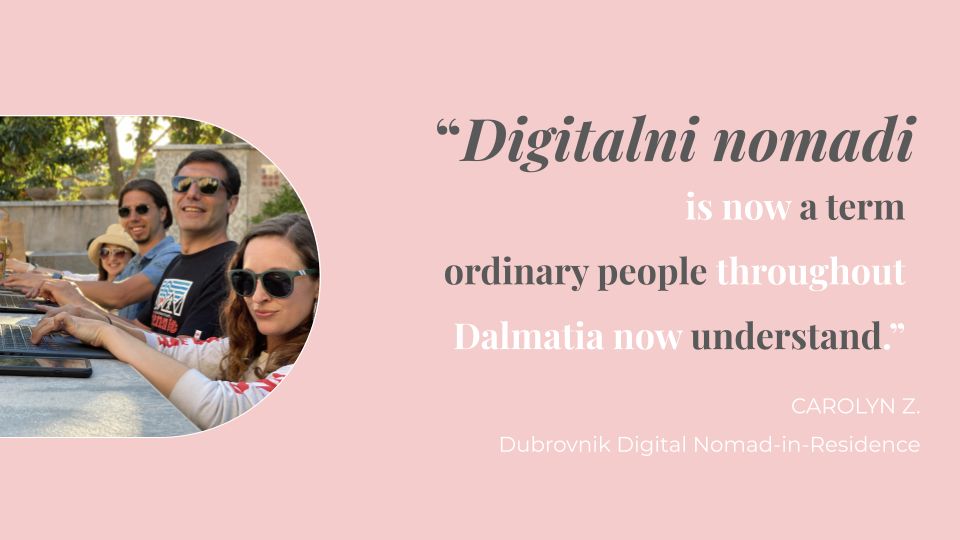
(Photo credit - Saltwater Nomads/Zoltan Nagy)
A very perceptive insight from one of the 10 Dubrovnik Digital Nomads-in-Residence pointed out something quite significant. The term 'digitalni nomadi' was now a term that was understood by many people in Croatia. Indeed, the term 'digitalni nomadi' can be heard with increasing frequency in the cafes of Croatia.
Yesterday was a year since the first-ever digital nomad conference in Croatia, Dubrovnik for Digital Nomads, and it was marked by a workshop called '1 Year On Dubrovnik for Digital Nomads Workshop', held at Lazareti.
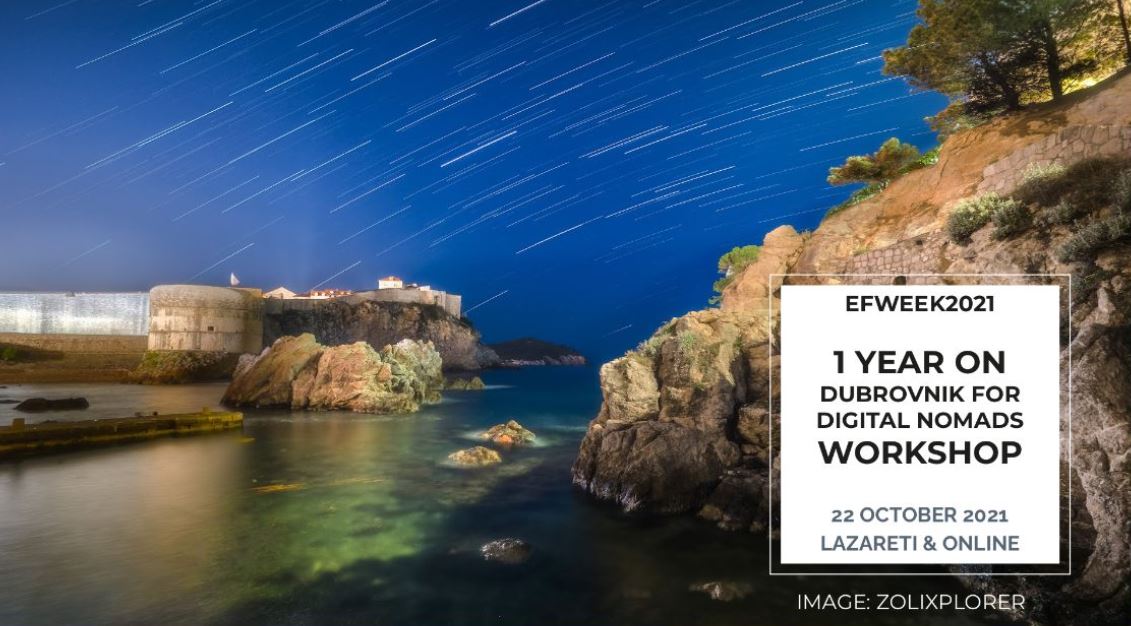
It was quite a workshop, as Dubrovnik Tourist Board director announced no less than 3 co-working spaces, a co-living space, a DN info point, and what is believed to be the world's first destination digital nomad card. You can learn more in Beyond the Walls: DN-i-R Presents Sustainable Dubrovnik Tourism Direction.
Last night, I was curious to see what coverage the event had generated, and so I googled 'digitalni nomadi' for an overview. And I smiled when I saw the results, another benchmark of the progress that has been made.
There was reasonable coverage of the Dubrovnik event, but that was not what made me smile. In recent days, there were as many as EIGHT news stories - all different - about digital nomad tourism, from the Istrian peninsula to the capital of Montenegro, via Bosnia and Hercegovina. What started in this region as a local Croatian initiative is already transcending borders. This is excellent news, as a collaborative region will attract more nomads, and for longer.
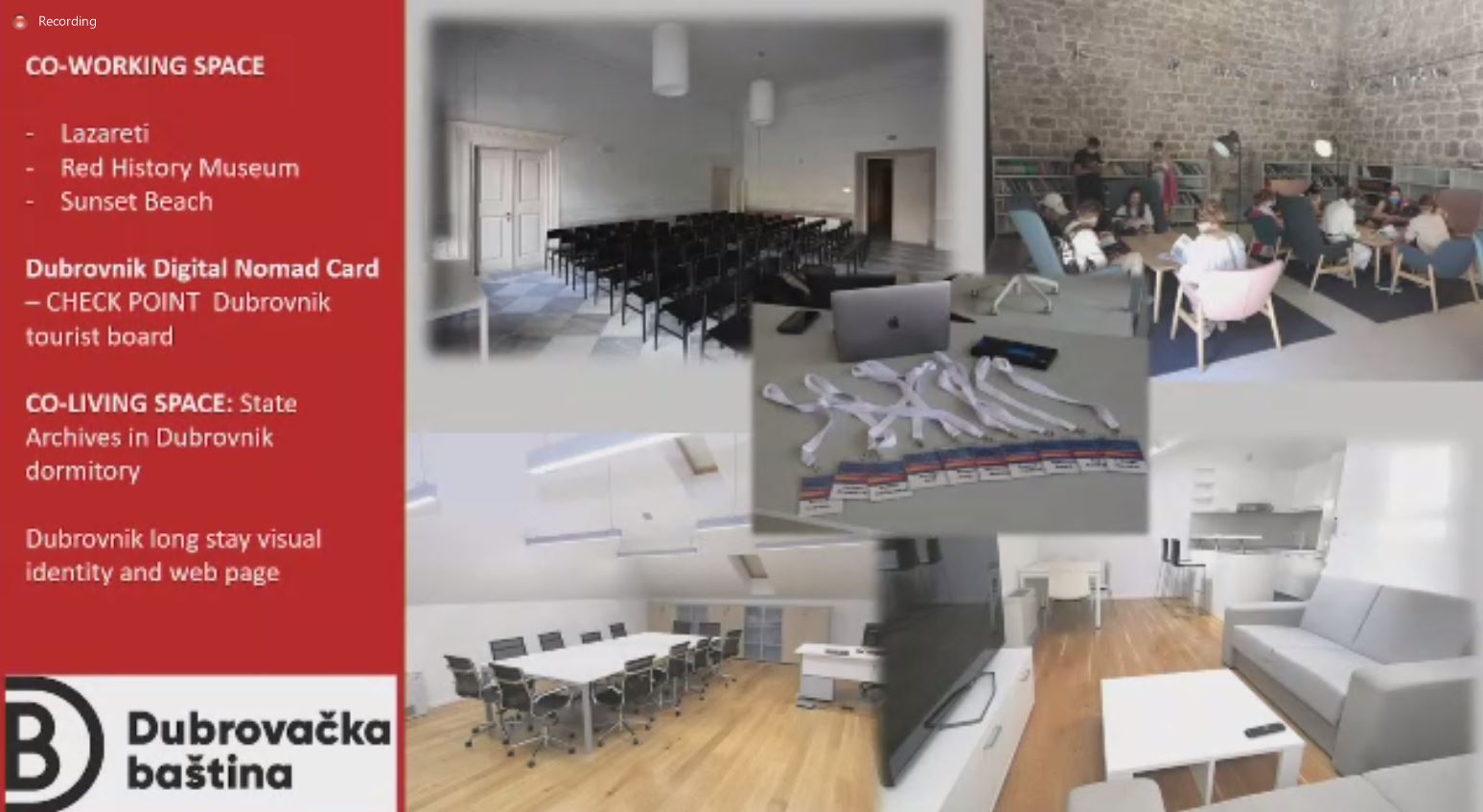
Here is an overview of the 'digitalni nomadi' stories which are making the local and regional news in recent days:
Digital nomads are increasingly attracted to Bosnia and Hercegovina (raport.ba)
Over 5,000 accommodation listings on the new DNA Stay (an initiative from the Digital Nomad Association Croatia) (poslovni.hr)
Istria is becoming a Mecca for digital nomads (glasistre.hr)
Zagreb in top 5 most-liked cities by nomads, according to NomadList (moja-domovina.hr)
1 Year On Dubrovnik for Digital Nomads Workshop report (dubrovnikdnevnik.hr)
Montenegro opens its doors to nomads with a visa in 2022 (pobjeda.me)
Cooperation agreement signed between the City of Mostar and INTERA-TP (bljesak.info)
Even the Kingdom of Accidental Tourism managed to get involved, with an HTZ-written article on Digital Nomad Valley Zadar, which opened almost 2 weeks ago, which is when the rest of the media reported on it (slobodnadalmacija.hr). The fact that the Croatian National Tourist Board authored the article is interesting, since normally they have a strict policy of not promoting private business initiatives. Perhaps the digital nomad movement is breaking down even more barriers than we realise.
An interview with Milovan Novakovic on YouTube, one of the pioneers of the Montenegrin visa, on the potential for Montenegro in this sector.
Great stuff, and there will be even more stories next month. Digitalni Nomadi are here to stay, at least until their restless souls move on to the next destination.
For more news and views on digital nomads in Croatia, follow the dedicated TCN section.
First Time in 54 Years: Golden Pirouette Ice Skating Competition Moves from Zagreb
October 22, 2021 - The 53rd Golden Pirouette international skating competition will be held from December 8 to 11 at the Zibel Ice Hall in Sisak. For the first time in the 54-year history of this competition, the Golden Pirouette will be held outside Zagreb.
As the Ice Hall at the Zagreb Sports Hall has been out of order since the Zagreb earthquake, for the first time since 1967, and the first edition of the Golden Pirouette skating competition, Zagreb will not be the host, reports T.portal.
Across its over five-decade-long history, many international skaters have visited Zagreb and many have made their debut in the competition program in the Croatian capital. Fortunately, only the host city has changed this time around, and the Golden Pirouette will go on!
Thus, this year's edition of the legendary skating competition will be held in Sisak from December 8 to 11, 2021.
"Sisak was also damaged in the earthquake, but the local Ice Hall is newer, and there is no damage, so we had the option to come here or postpone the competition. With the help of the City of Sisak and the Sports and Recreation Center, we managed to solve all the technical issues needed to organize this competition, and we are glad that the people of Sisak will enjoy top skating," said Morana Paliković Gruden, president of the Croatian Skating Federation and vice president of the COC.
"I hope that this is the beginning of cooperation between Sisak and the Croatian Skating Federation and that the Golden Pirouette will attract visitors, but also encourage many Sisak citizens to get into ice sports. That is why we built the Ice Hall," added the mayor of Sisak Kristina Ikić Baniček.
The best competition is expected at this year's event as well, mainly because there are fewer skating competitions due to the pandemic. Many will use Sisak as an opportunity to qualify for the World Championship, which is scheduled for January 2022.
Five to seven Croatian competitors will perform at the first Golden Pirouette in Sisak, including the promising Croatian sports pair Lana Petranović and Antonio Suza.
Given the poor condition of the Zagreb Sports Hall, it is to be expected that the Zagreb Snowflakes Trophy will be held in Sisak from February 3 to 5, which they are working on intensively.
To follow the latest sports news in Croatia, follow TCN's dedicated page.
To learn more about sport in Croatia, CLICK HERE.
Poljud Ticket Sales for Decisive Croatia-Russia World Cup Qualifier Announced
October 22, 2021 - Tickets for the decisive Croatia-Russia World Cup qualifier at Poljud will go on sale on Monday!
The Croatian Football Federation has announced that the online ticket sales for the final 2022 World Cup qualifier against Russia will start on Monday at 1 pm.
The Croatia-Russia match is scheduled for Sunday, November 14 at Poljud, starting at 3 pm, and tickets will be sold through the HNS ticket portal at the following prices:
West middle - 200 kuna, West - 150 kuna, East Middle 120 kuna, East - 100 kuna, North / South - 80 kuna.
On the day of the match, tickets will be sold at the following prices:
West middle - 250 kuna, West - 200 kuna, East middle - 150 kuna, East - 120 kuna, North / South - 100 kuna.
The Croatian Football Federation emphasized that all persons coming to the stadium must have an EU digital COVID certificate, i.e., that vaccination certificates or recovery certificates will not be recognized, as well as various test results, but only an EU digital COVID certificate with a valid QR code that will be checked at the entrance.
HNS will also provide rapid antigen testing points, after which everyone who tests negative will receive an EU digital COVID passport necessary to enter the stadium. The price, location, and opening hours of the testing point will be announced at a later date.
Ticket sales include e-tickets that the customer must download and print, and only citizens of the Republic of Croatia have the right to purchase, regardless of residence address, by filling in the required personal information.
Due to special epidemiological measures in the stands, one person can buy up to four (4) tickets. In addition to their data, the customer also enters data on the other ticket holders, where they do not necessarily have to be a citizen of the Republic of Croatia.
Tickets will be available at the ticket portal, where you can find detailed information on ticket sales and payment methods.
HNS warns fans that guards will check the accuracy of personal data on the tickets when entering the stadium. Fans who try to enter the stadium with a ticket under another name will be denied entry. Therefore, HNS urges fans not to buy tickets on the "black market" or from scalpers.
The Croatia-Russia match will decide the winner of the Group H World Cup qualifying group, i.e., the team that will secure a direct place in Qatar, while the second-placed team will advance to additional qualifications. Two rounds before the end, Russia leads the group with 19 points and in second is Croatia with 17 points. Before the decisive clash at Poljud, Russia will host Cyprus, while Croatia will host Malta. Both Russia and Croatia are expected to win their penultimate matches.
To follow the latest sports news in Croatia, follow TCN's dedicated page.
To learn more about sport in Croatia, CLICK HERE.
Croatians in Switzerland Granted Equal EU Working Rights from January 1, 2022
October 22, 2021 - Croatians in Switzerland will be granted the same working rights as the rest of the EU/EFTA nationals from January 1, 2022.
Switzerland will open its labor market for workers from Croatia at the beginning of 2022, and they will be equal to other citizens of EU member states, the official website of the Swiss presidency announced on Friday.
24 Sata reported that Switzerland informed the European Union at the 24th meeting of the Switzerland-European Union Joint Committee on the Agreement on Free Movement of People, which was held on Friday by video conference due to the Covid-19 pandemic.
Switzerland has so far applied labor market protection measures for citizens of the Republic of Croatia under this Agreement (Protocol III AELE).
"At its session on October 1, the Swiss Federal Council decided to grant the status of free movement of people to the citizens of the Republic of Croatia starting from January 1, 2022," the website reads.
Should Croatian immigrant workers cross a certain threshold, Switzerland could reach for a safeguard provision and re-limit permits for workers to come from Croatia from 1 January 2023 or at the end of 2026 at the latest, the statement said.
As of December 31, 2020, 28,324 Croatian workers were staying in Switzerland, which is 6 more than in the previous year. That number is 1.9 percent of European Union or AELE citizens living in Switzerland.
Schengen Visa Info reports that Croatians were previously permitted to work in Switzerland under specific quotas for Croats wishing to live and work in Switzerland.
"Swiss-based companies interested in hiring a Croat also had to apply for a work permit and show that prior search efforts in Switzerland to fill the post have been unsuccessful. Such rules had been in place since the beginning of January 2017.
When Croatia became an EU member in 2013, the accession agreement gave the Member States the possibility of putting into use a transitional period of seven years before permitting workers from Croatia to work in their territory under the same rights as the rest of the EU countries. A similar transitional period had been applied to Romania and Bulgaria when they joined the EU.
At first, 13 countries had imposed the transitional period restrictions on Croatians, which are Austria, Belgium, Cyprus, France, Greece, Italy, Luxemburg, Malta, the Netherlands, Germany, Slovenia, Spain, and the United Kingdom," Schengen Visa Info added.
The majority of these countries no longer have restrictions on Croatian workers.
For more news in Croatia, follow TCN's dedicated page.


